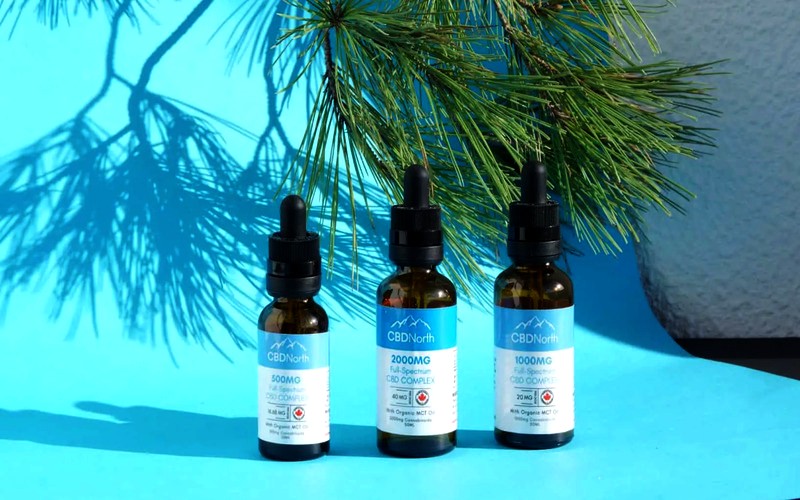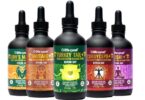Full-spectrum CBD has a wide range of cannabinoids in it, including trace amounts of THC, so that is why THC concentration is below 0.3%, which is legal by federal mandate stated in dry weight. The THC content of the full spectrum CBD does not reach the level of the THC of the other forms like the broad-spectrum and the isolate forms, which have the THCs reduced and/or eliminated wholly. Although the content of THC in these quantities is not high enough to cause psychoactive effects on its own, this effect is due to the presence of the combination of two compounds since they are both believed to have a therapeutic effect.
Nonetheless, it is vital that those who are subject to and governed by strict drug rules tightly monitor THC traces in the Full spectrum CBD products to steer clear of drug tests. THC knowledge is a key factor for conscious decision-making so that one can enjoy the health benefits of CBD products but also ensure that he/she doesn’t break the laws or if a particular job requires random drug testing.
What is Full Spectrum CBD?
A Full Spectrum CBD is a distinct product of CBD that is marked by an all-encompassing characterization of the plant, which includes cannabinoids, terpenes, and all other phytochemicals. CBD isolate will be a product comprising Cannabidiol alone, as opposed to Full Spectrum CBD, which will also contain other cannabinoids as well as some THC in very small quantities. The entourage effect is an effect based on the theory that the healing effect of the whole plant comes into play rather than the sum of its parts. The Reason of this effect of these compounds is that they combine to form a unit so that they exploit the entourage effect.
Full Spectrum CBD products are especially in demand due to the possibility of providing a wider variety of therapeutic effects. This is because of the synergistic effect of the different cannabinoids and terpenes. For instance, Full Spectrum CBD oil is commonly used for its ability to alleviate pain, decrease inflammation, and promote better sleep, as well as other health benefits.
It must be mentioned that some Full Spectrum CBD products contain THC, but the level is less than 0.3% to meet federal regulations. Such a small amount of THC in CBD oil and other Full Spectrum products is not enough to affect the human mind, and psychoactive effects do not occur, so these products are a safe choice for people who do not want to get high on marijuana.
Nevertheless, the THC content, no matter how low, implies that users of Full Spectrum CBD oil and other products should be observant of possible drug test implications. Although the risk of intoxication is low, the minimal of THC in CBD products may trigger a positive drug test result if the test is sensitive.
How Much THC is in Full Spectrum CBD?
The CBD products with full-spectrum distinction stand out in the health and wellness market because their phytochemical profile goes beyond CBD as it also includes minor cannabinoids, terpenes, and traces of THC. In addition, users need to be aware of the THC content in these products because there is an increasing demand for the health benefits of cannabis without THC, which is regarded as the one responsible for the high effect. Federally, Full Spectrum CBD must have under 0.3% THC by dry weight, a limit ensuring that users can experience the plant’s benefits safely.
This minor THC inclusion plays a significant role by contributing to the entourage effect. This effect theorizes that the therapeutic efficacy of Full Spectrum CBD products is amplified by the synergistic interaction between its diverse compounds. The presence of THC, even in trace amounts, alongside CBD, minor cannabinoids, and terpenes, is believed to significantly enhance the product’s health benefits, making Full Spectrum CBD oil and similar products highly sought after for their potential to offer a more potent therapeutic impact.
However, the presence of THC, despite being minimal, carries implications for drug testing. Users should be mindful of the slight risk of testing positive for THC in drug screenings, particularly with regular or substantial consumption. This risk underscores the importance of informed decision-making when choosing Full Spectrum CBD, balancing the desire for comprehensive cannabis benefits with the considerations of THC’s legal and personal implications.
Ultimately, Full Spectrum CBD is favored for its holistic approach to harnessing hemp’s wellness properties, aiming to deliver maximum therapeutic value through a natural, plant-based composition. This approach appeals to those eager to tap into the full spectrum of benefits offered by hemp while carefully navigating THC’s presence.
What are the Differences Between CBD and THC?
Chemical Structure
The common chemical structure is shared by both CBD (cannabidiol) and THC (tetrahydrocannabinol), having 21 carbon atoms, 30 hydrogen atoms, and 2 oxygen atoms in their molecule. Nonetheless, the structure of these atoms varies hence resulting in the different effects that different drugs have on the body. The structure that differs from THC is the reason why it is psychoactive, making you feel high after using cannabis, while CBD is non-psychoactive and has the effect of relaxation without being intoxicated.
Psychoactive Effects
The effect that CBD and THC have on the mind and emotions is among the most prominent differences between them. THC has the propensity to attach to CB1 receptors in the brain, resulting in a high feeling. On the other hand, CBD doesn’t bind to CB1 receptors at all. Contrarily, the role of cannabinoids does not depend on receptors in the body, rather it contribute to the therapeutic effects without generating a high. This key distinction is one reason why many people prefer to use CBD oil in order to get help with anxiety, pain, and some forms of seizure without having to deal with the psychoactive effects that THC-inclusive products bear.
Legal Status
The laws on CBD and THC differ substantially in different jurisdictions. Often, CBD products from hemp (with less than 0.3% of THC) are allowed, while THC containing higher levels of those are subjected to rigorous regulations. The legal discrepancy between Hemp and Cannabis is of essence to those who are willing to enjoy the advantages of CBD minus the legal risks that come with the consumption of THC.
Drug Testing
Truthfully, one of the main issues for many users is drug testing. CBD products, particularly those specially marked as CBD oil, usually have a low level of THC, and that is why they are not likely to produce a positive drug test result. Although the majority of CBD products might have very low traces of THC, which could lead to a false-positive test result, such a case nevertheless stresses the point of searching for the right product with a correct label.
Does CBD Get You High?
Not only does CBD stand as the most popular compound of the hemp family plants, but it is also becoming widely used by people. Instead of THC (tetrahydrocannabinol), which is the major cannabis compound causing the high, CBD (cannabidiol) is non-psychoactive, meaning that it is not for those craving that weed sensation. As CBD products, including CBD oil, emerge on the market because of their possible health benefits and the psychoactive effects of THC, these products turn into market success. CBD effect is therapeutic, and its major implication is that CBD can be used for symptom treatment, which includes anxiety, better sleep, and pain control.
If you look at the case of CBD and other CBD products from the point of view of their users, you should know that they are able to decrease some symptoms, while they do not change the state of mind, unlike THC-containing products. CBD has an effect on the endocannabinoid system in the body because it attaches to the different receptors and has the property of creating a calm and pleasant feeling but not the intoxication that comes from THC. Therefore, for those questioning, “Does CBD get you high?” the answer is straightforward: This is mostly because CBD does not give the common euphoric effects associated with cannabis; therefore, these CBD products will serve as an alternative for people who want to enjoy the benefits of cannabis but do not want to get high.
Different Types of CBD Oil
Full Spectrum CBD Oil
Full spectrum CBD oil is the one to buy if you want a “whole plant” formula comprising all cannabinoids, terpenes, and organic oils found in the cannabis plant. Evidently, through this certain amount of THC, the entourage effect is caused where the synergistic effect of other cannabis plant elements is greater than that from any single isolated compound. Full Spectrum CBD is commonly chosen by people because they believe it can offer them more of these medicinal benefits, in fact, which brings it a lot of popularity among these people who seek to utilize the full hemp plant advantages for their health routine.
Broad Spectrum CBD Oil
As a middle ground between Full Spectrum CBD and CBD Isolate, broad-spectrum CBD oil presents a more effective alternative. It consists of a wide array of CBD compounds, terpenoids, and so forth, like CBD Full Spectrum, but in contrast with the Full Spectrum has all THC removed. This serves the purpose of providing the users with all the great benefits that this effect offers without the need for THC. One of the main selling points of Broad Spectrum CBD is the attention to people who have personal preferences, drug test concerns, or legal worries about THC, so the CBD product would offer the whole spectrum of plant compounds but without the high.
Isolate CBD Oil
CBD Isolate Oil is the most refined form and almost pure CBD, consisting of over 99% Cannabidiol oil with all other plant substances removed. It’s the obvious choice for people looking for the desired benefits of CBD in their system, but nothing else from the cannabinoids and terpenes part of the plant. CBD Isolate is an ideal one for those who take a high dose of CBD or have unwanted sensitivity to other compounds of cannabis. Its tasteless and odorless nature is a plus as it enables mixing the product into products of other companies, and therefore, the clients get a chance to decide on the product that would better match their choices and needs.
Does CBD Show Up On a Drug Test?
CBD does not show up on regular drug tests because such tests usually have the capacity to detect the presence of THC, which is the psychoactive compound of cannabis plants. Many drug screenings are designed to detect THC or THC metabolites; hence, CBD will most probably not be detected in such screenings. Although the complexities of CBD products and their composition can lead in some way to certain irregularities, it is still a matter for future studies and research. For example, Full Spectrum CBD products are made up of a very small percentage of THC (less than 0.3%), which can trigger a positive Drug Test result if consumed constantly over time.
On the contrary, Broad Spectrum CBD and CBD Isolate products, which are formulated using techniques that remove THC, put you at a lesser risk of having positive drug test results. However, the absence of regulations in this industry can sometimes mean wrong labeling of the products or the addition of THC to CBD products that are being sold, which can pose a risk for the people who are facing drug screen that will come out positive.
What are the Benefits of Full-Spectrum CBD?
Entourage Effect Enhancement
One benefit of Full-spectrum CBD oil is its potential to facilitate the entourage effect. This observation indicates that numerous mechanisms are involved in the therapeutic effect and that cannabinoids work in synergy. The different combinations of cannabinoids, terpenes, and flavonoids in the whole spectrum of CBD are in synergy, which helps in the amplification of the health advantages, possibly giving the individual relief from pain, inflammation, and anxiety. This integrated method captures the maximum performance of the hemp plant that, in turn, makes full-spectrum CBD the favorite choice for those who want overall well-being.
Broader Range of Health Benefits
This full-spectrum CBD may also have many health benefits including both the pharmacological and non-pharmacological activities of minor cannabinoids. An example is the case when CBD, which is an anti-inflammatory and anxiolytic drug, is endowed with more bioactive properties, such as the anti-inflammatory, anti-bacterial, and anti-cancer properties that are also found in other cannabinoids like CBC and CBG. The full spectrum nature of CBD oil, with its range of possible health benefits, makes it an all-rounder in natural health and wellness, fitting different conditions, needs, and regimes.
Natural Composition
The premium point of the full-spectrum CBD is its natural form, which is considered closer to the chemical composition of the original hemp plant. This way of processing CBD retains all the biologically active substances (composed of terpenes) that have pronounced therapeutic effects of their own, which is an added advantage as it contributes to the overall efficacy of the product. Those who are open to a more natural method of supplementing may find the full-spectrum CBD to be an organic choice that presents a plant-based solution well-suited to holistic health practices, providing a mild yet effective substitute for synthetic medications.
FAQs
Is CBD Effective Without THC?
Yes, CBD can be effective without THCs, which is the reason why some of users say they benefit from the use of CBD isolate and broad-spectrum CBD products because it doesn’t contain THC. These products can be used to soothe anxiety and inflammation and also help reduce pain. The effectiveness of CBD, but without THC gives confidence that it can be used even for people who desire to get therapeutic benefits without the psychoactive effects that THC could cause.
Is Full Spectrum CBD Safe For Everyone?
Full Spectrum CBD is normally safe for the majority of people, but for certain, it might not be suitable for all. All who are expecting, nursing, or have certain probable health conditions need to seek medical consultancy before using the product. Besides that, the traces of THC in Full Spectrum CBD might be a problem for people who are taking drug tests.
Does broad-spectrum CBD contain THC?
No, the hemp-derived CBD oils are strictly free of THC. It is in the recipe between full spectrum CBD and CBD isolate; it includes various cannabinoids and terpenes of the hemp plant and leaves with THC. Hence, it is a perfect solution for people who are not able to tolerate THC but still desire the whole spectrum of functioning.
Is Full spectrum CBD better than broad-spectrum CBD?
If consumers prefer the fullness of the product, broad-spectrum CBD would be their best option. But, if consumers look for better CBD purity and absence of THC, full spectrum CBD would better their needs. Cannabidiol (CBD), in full spectrum, may bring about the entourage effect by combining THC, making it a potent and effective potential therapeutic agent. Beyond-spectrum CBD is nearly similar to it, but it does without THC. The decisions between the two essentially would be dependent on the individual consideration of THC sensitivity and legal issues of the place.
Does Full Spectrum CBD Help With Pain?
Yes, Full Spectrum CBD is effective for pain management. It involves adding CBD and other cannabinoids and terpenes together, which could lead to the formation of the entourage effect, which is for increasing its pain and inflammation-reducing effects. People suffering from chronic pain, arthritis, and muscle soreness are often reporting very significant relief from their symptoms, which is the main attraction of Full Spectrum CBD for natural pain management.
Conclusion
In summary, Full-Spectrum CBD is distinguished by the fact that it contains all the essential cannabinoids, including trace amounts of THC (below 0.3%), which remain in compliance with national law. THC is present in very low amounts in these products. Although this low THC content does not cause any psychoactive effects, it plays a crucial role in producing the entourage effect, and it accompanies CBD in offering therapeutic benefits. Full Spectrum CBD products are the choice of many for their perceived ability to support a wider variety of health benefits on account of the potential synergistic effect of cannabinoids and terpenes. It is the ideal solution for those who want to utilize the plant for pain reduction, inflammation elimination, and other holistic health purposes. On the flip side, individuals are advised to be wary of the THC content, essentially if they are going for a drug test, and choose from brands that are reputable and accurately determine their CBD content. For people who are willing to know more about Full Spectrum CBD and also for those who are interested in buying high-quality products, visiting the websites of credible brands can be a good start.








